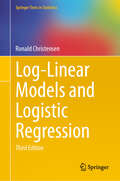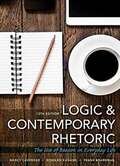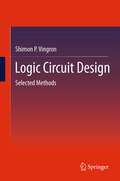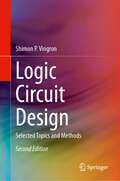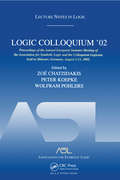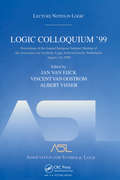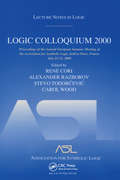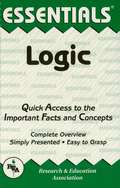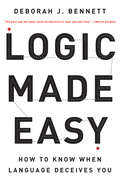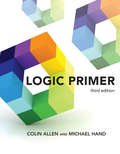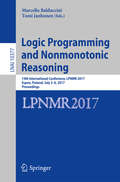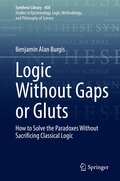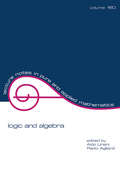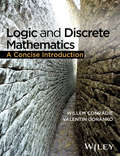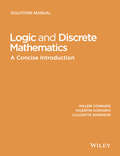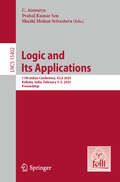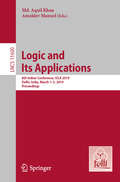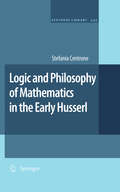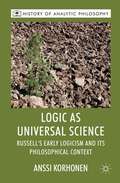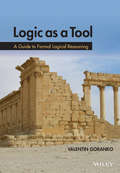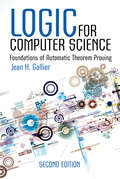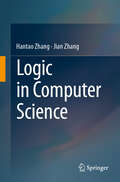- Table View
- List View
Log-Linear Models and Logistic Regression (Springer Texts in Statistics)
by Ronald ChristensenThis book examines statistical models for frequency data. The primary focus is on log-linear models for contingency tables but also includes extensive discussion of logistic regression. Topics such as logistic discrimination, generalized linear models, and correspondence analysis are also explored. The treatment is designed for readers with prior knowledge of analysis of variance and regression. It builds upon the relationships between these basic models for continuous data and the analogous log-linear and logistic regression models for discrete data. While emphasizing similarities between methods for discrete and continuous data, this book also carefully examines the differences in model interpretations and evaluation that occur due to the discrete nature of the data. Numerous data sets from fields as diverse as engineering, education, sociology, and medicine are used to illustrate procedures and provide exercises. A major addition to the third edition is the availability of a companion online manual providing R code for the procedures illustrated in the book. The book begins with an extensive discussion of odds and odds ratios as well as concrete illustrations of basic independence models for contingency tables. After developing a sound applied and theoretical basis for frequency models analogous to ANOVA and regression, the book presents, for contingency tables, detailed discussions of the use of graphical models, of model selection procedures, and of models with quantitative factors. It then explores generalized linear models, after which all the fundamental results are reexamined using powerful matrix methods. The book then gives an extensive treatment of Bayesian procedures for analyzing logistic regression and other regression models for binomial data. Bayesian methods are conceptually simple and unlike traditional methods allow accurate conclusions to be drawn without requiring large sample sizes. The book concludes with two new chapters: one on exact conditional tests for small sample sizes and another on the graphical procedure known as correspondence analysis.
Logic And Contemporary Rhetoric: The Use Of Reason In Everyday Life (Mindtap Course List Ser.)
by Frank Boardman Nancy M. Cavender Howard KahaneLOGIC AND CONTEMPORARY RHETORIC: THE USE OF REASON IN EVERYDAY LIFE, 13th Edition, introduces you to sound reasoning using current, relevant, and stimulating examples in a witty and invigorating writing style. Combining examples from television, newspapers, magazines, advertisements, and our nation's political dialogue, this classic text brings the concepts to life and puts critical-thinking skills into a context that you will retain and use throughout your life.
Logic Circuit Design
by Shimon P. VingronIn three main divisions the book covers combinational circuits, latches, and asynchronous sequential circuits. Combinational circuits have no memorising ability, while sequential circuits have such an ability to various degrees. Latches are the simplest sequential circuits, ones with the shortest memory. The presentation is decidedly non-standard. The design of combinational circuits is discussed in an orthodox manner using normal forms and in an unorthodox manner using set-theoretical evaluation formulas relying heavily on Karnaugh maps. The latter approach allows for a new design technique called composition. Latches are covered very extensively. Their memory functions are expressed mathematically in a time-independent manner allowing the use of (normal, non-temporal) Boolean logic in their calculation. The theory of latches is then used as the basis for calculating asynchronous circuits. Asynchronous circuits are specified in a tree-representation, each internal node of the tree representing an internal latch of the circuit, the latches specified by the tree itself. The tree specification allows solutions of formidable problems such as algorithmic state assignment, finding equivalent states non-recursively, and verifying asynchronous circuits.
Logic Circuit Design: Selected Topics and Methods
by Shimon P. VingronThe 2nd edition has been thoroughly revised and is intended as a wakeup call in the stagnant and dormant field of switching algebra and logic circuit design. It presents the material in a concise but thorough way. The topics selected are an in-depth presentation of switching algebra, a theory of memory circuits (sometimes called flop flops), a new approach to asynchronous circuits, and a newly added part presenting a unique programming technique (or language) for programmable logic controllers (PLCs). Be ready for the unorthodox and controversial.
Logic Colloquium '02: Lecture Notes in Logic 27
by Peter Koepke Wolfram Pohlers Zoé ChatzidakisLogic Colloquium '02 includes articles from some of the world's preeminent logicians. The topics span all areas of mathematical logic, but with an emphasis on Computability Theory and Proof Theory. This book will be of interest to graduate students and researchers in the field of mathematical logic.
Logic Colloquium '99: Lecture Notes in Logic 17
by Jan Van Eijck Vincent Van Oostrom Albert VisserA compilation of papers presented at the 1999 European Summer Meeting of the Association for Symbolic Logic, Logic Colloquium '99 includes surveys and research articles from some of the world's preeminent logicians. Two long articles are based on tutorials given at the meeting and present accessible expositions of current research in two active are
Logic Colloquium 2000 (hardcover): Lecture Notes in Logic, 19
by Carol Wood René Cori Alexander Razborov Stevo TodorčevićThis compilation of papers presented at the 2000 European Summer Meeting of the Association for Symbolic Logic marks the centenial anniversery of Hilbert's famous lecture. Held in the same hall at La Sorbonne where Hilbert first presented his famous problems, this meeting carries special significance to the Mathematics and Logic communities.
Logic Essentials
by W. Kent WilsonREA's Essentials provide quick and easy access to critical information in a variety of different fields, ranging from the most basic to the most advanced. As its name implies, these concise, comprehensive study guides summarize the essentials of the field covered. Essentials are helpful when preparing for exams, doing homework and will remain a lasting reference source for students, teachers, and professionals. Logic covers the basic concepts of logic, including sentences, arguments, and the evaluation of arguments. This book will give the reader a clear understanding of sentence logic such as symbolization, semantics, and truth trees by giving concise definitions and examples of each.
Logic Made Easy: How to Know When Language Deceives You
by Deborah J. Bennett"The best introduction to logic you will find."--Martin Gardner "Professor Bennett entertains as she instructs," writes Publishers Weekly about the penetrating yet practical Logic Made Easy. This brilliantly clear and gratifyingly concise treatment of the ancient Greek discipline identifies the illogical in everything from street signs to tax forms. Complete with puzzles you can try yourself, Logic Made Easy invites readers to identify and ultimately remedy logical slips in everyday life. Designed with dozens of visual examples, the book guides you through those hair-raising times when logic is at odds with our language and common sense. Logic Made Easy is indeed one of those rare books that will actually make you a more logical human being.
Logic Primer, third edition
by Colin Allen Michael HandThe new edition of a comprehensive and rigorous but concise introduction to symbolic logic.Logic Primer offers a comprehensive and rigorous introduction to symbolic logic, providing concise definitions of key concepts, illustrative examples, and exercises. After presenting the definitions of validity and soundness, the book goes on to introduce a formal language, proof theory, and formal semantics for sentential logic (chapters 1–3) and for first-order predicate logic (chapters 4–6) with identity (chapter 7). For this third edition, the material has been reorganized from four chapters into seven, increasing the modularity of the text and enabling teachers to choose alternative paths through the book. New exercises have been added, and all exercises are now arranged to support students moving from easier to harder problems. Its spare and elegant treatment makes Logic Primer unique among textbooks. It presents the material with minimal chattiness, allowing students to proceed more directly from topic to topic and leaving instructors free to cover the subject matter in the way that best suits their students. The book includes more than thirty exercise sets, with answers to many of them provided in an appendix. The book&’s website allows students to enter and check proofs, truth tables, and other exercises interactively.
Logic Programming and Nonmonotonic Reasoning
by Marcello Balduccini Tomi JanhunenThis Festschrift volume, published in honor of Michael Gelfond on the occasion of his 65th birthday, contains a collection of papers written by his closest friends and colleagues. Several of these papers were presented during the Symposium on Constructive Mathematics in Computer Science, held in Lexington, KY, USA on October 25-26, 2010. The 27 scientific papers included in the book focus on answer set programming. The papers are organized in sections named "Foundations: ASP and Theories of LP, KR, and NMR", "ASP and Dynamic Domains", and "ASP - Applications and Tools".
Logic Without Gaps or Gluts: How to Solve the Paradoxes Without Sacrificing Classical Logic (Synthese Library #458)
by Benjamin Alan BurgisThis book offers a defense against non-classical approaches to the paradoxes. The author argues that, despite appearances, the paradoxes give no reason at all to reject classical logic. In fact, he believes classical solutions fare better than non-classical ones with respect to key tests like Curry’s Paradox, a Liar-like paradox that dialetheists are forced to solve in a way totally disjoint from their solution to the Liar. Graham Priest’s In Contradiction was the first major work that advocated the use of non-classical approaches. Since then, these views have moved into the philosophical mainstream. Much of this movement is fueled by a widespread sense that these logically heterodox solutions get to the real nub of the issue. They lack the ad hoc feel of many other solutions to the paradoxes. The author believes that it's long past time for a response to these attacks against classical orthodoxy. He presents a non-logically-revisionary solution to the paradoxes. This title offers a literal way of cashing out the disquotation metaphor. While the details of the view are novel, the idea has a pre-history in the relevant literature. The author examines objections in detail. He rejects each in turn and concludes by comparing the virtues of his logically orthodox approach with those of the paraconsistent and paracomplete competition.
Logic and Algebra (Lecture Notes In Pure And Applied Mathematics Ser. #180)
by Aldo Ursini Paolo Aglianò""Attempts to unite the fields of mathematical logic and general algebra. Presents a collection of refereed papers inspired by the International Conference on Logic and Algebra held in Siena, Italy, in honor of the late Italian mathematician Roberto Magari, a leading force in the blossoming of research in mathematical logic in Italy since the 1960s.
Logic and Algebraic Structures in Quantum Computing
by Jennifer Chubb Ali Eskandarian Valentina HarizanovArising from a special session held at the 2010 North American Annual Meeting of the Association for Symbolic Logic, this volume is an international cross-disciplinary collaboration with contributions from leading experts exploring connections across their respective fields. <P><P>Themes range from philosophical examination of the foundations of physics and quantum logic, to exploitations of the methods and structures of operator theory, category theory, and knot theory in an effort to gain insight into the fundamental questions in quantum theory and logic. The book will appeal to researchers and students working in related fields, including logicians, mathematicians, computer scientists, and physicists. A brief introduction provides essential background on quantum mechanics and category theory, which, together with a thematic selection of articles, may also serve as the basic material for a graduate course or seminar.
Logic and Discrete Mathematics: A Concise Introduction
by Valentin Goranko Willem ConradieA concise yet rigorous introduction to logic and discrete mathematics. This book features a unique combination of comprehensive coverage of logic with a solid exposition of the most important fields of discrete mathematics, presenting material that has been tested and refined by the authors in university courses taught over more than a decade. The chapters on logic - propositional and first-order - provide a robust toolkit for logical reasoning, emphasizing the conceptual understanding of the language and the semantics of classical logic as well as practical applications through the easy to understand and use deductive systems of Semantic Tableaux and Resolution. The chapters on set theory, number theory, combinatorics and graph theory combine the necessary minimum of theory with numerous examples and selected applications. Written in a clear and reader-friendly style, each section ends with an extensive set of exercises, most of them provided with complete solutions which are available in the accompanying solutions manual. Key Features: Suitable for a variety of courses for students in both Mathematics and Computer Science. Extensive, in-depth coverage of classical logic, combined with a solid exposition of a selection of the most important fields of discrete mathematics Concise, clear and uncluttered presentation with numerous examples. Covers some applications including cryptographic systems, discrete probability and network algorithms. Logic and Discrete Mathematics: A Concise Introduction is aimed mainly at undergraduate courses for students in mathematics and computer science, but the book will also be a valuable resource for graduate modules and for self-study.
Logic and Discrete Mathematics: A Concise Introduction, Solutions Manual
by Valentin Goranko Willem Conradie Claudette RobinsonSolutions manual to accompany Logic and Discrete Mathematics: A Concise Introduction This book features a unique combination of comprehensive coverage of logic with a solid exposition of the most important fields of discrete mathematics, presenting material that has been tested and refined by the authors in university courses taught over more than a decade. Written in a clear and reader-friendly style, each section ends with an extensive set of exercises, most of them provided with complete solutions which are available in this accompanying solutions manual.
Logic and Its Applications: 11th Indian Conference, ICLA 2025, Kolkata, India, February 3–5, 2025, Proceedings (Lecture Notes in Computer Science #15402)
by Shashi Mohan Srivastava C. Aiswarya Prabal Kumar SenThis book constitutes the refereed proceedings of the 11th Indian Conference on Logic and Its Applications, ICLA 2025, held in Kolkata, India, during February 3–5, 2025. Four out the five invited talks are included in this book. Out of the 26 submissions, the program committee carefully selected 14 papers to be included in the proceedings. The topics included are Mathematics, Computer Science, Philosophy, Linguistics and Cognitive Science. A special feature of ICLA is the inclusion of studies in systems of logic in the Indian tradition, as well as historical research on logic.
Logic and Its Applications: 8th Indian Conference, ICLA 2019, Delhi, India, March 1-5, 2019, Proceedings (Lecture Notes in Computer Science #11600)
by Md. Aquil Khan Amaldev ManuelThis book collects the refereed proceedings of the 8th Indian Conference on Logic and Its Applications, ICLA 2019, held in Delhi, India, in March 2019. The volume contains 13 full revised papers along with 6 invited talks presented at the conference. The aim of this conference series is to bring together researchers from a wide variety of fields in which formal logic plays a significant role. Areas of interest include mathematical and philosophical logic, computer science logic, foundations and philosophy of mathematics and the sciences, use of formal logic in areas of theoretical computer science and artificial intelligence, logic and linguistics, and the relationship between logic and other branches of knowledge. Of special interest are studies in systems of logic in the Indian tradition, and historical research on logic.
Logic and Philosophy of Mathematics in the Early Husserl
by Stefania CentroneLogic and Philosophy of Mathematics in the Early Husserl focuses on the first ten years of Edmund Husserl's work, from the publication of his Philosophy of Arithmetic (1891) to that of his Logical Investigations (1900/01), and aims to precisely locate his early work in the fields of logic, philosophy of logic and philosophy of mathematics. Unlike most phenomenologists, the author refrains from reading Husserl's early work as a more or less immature sketch of claims consolidated only in his later phenomenology, and unlike the majority of historians of logic she emphasizes the systematic strength and the originality of Husserl's logico-mathematical work. The book attempts to reconstruct the discussion between Husserl and those philosophers and mathematicians who contributed to new developments in logic, such as Leibniz, Bolzano, the logical algebraists (especially Boole and Schröder), Frege, and Hilbert and his school. It presents both a comprehensive critical examination of some of the major works produced by Husserl and his antagonists in the last decade of the 19th century and a formal reconstruction of many texts from Husserl's Nachlaß that have not yet been the object of systematical scrutiny. This volume will be of particular interest to researchers working in the history, and in the philosophy, of logic and mathematics, and more generally, to analytical philosophers and phenomenologists with a background in standard logic.
Logic and Philosophy of Mathematics in the Early Husserl (Synthese Library #345)
by Stefania CentroneLogic and Philosophy of Mathematics in the Early Husserl focuses on the first ten years of Edmund Husserl’s work, from the publication of his Philosophy of Arithmetic (1891) to that of his Logical Investigations (1900/01), and aims to precisely locate his early work in the fields of logic, philosophy of logic and philosophy of mathematics. Unlike most phenomenologists, the author refrains from reading Husserl’s early work as a more or less immature sketch of claims consolidated only in his later phenomenology, and unlike the majority of historians of logic she emphasizes the systematic strength and the originality of Husserl’s logico-mathematical work. The book attempts to reconstruct the discussion between Husserl and those philosophers and mathematicians who contributed to new developments in logic, such as Leibniz, Bolzano, the logical algebraists (especially Boole and Schröder), Frege, and Hilbert and his school. It presents both a comprehensive critical examination of some of the major works produced by Husserl and his antagonists in the last decade of the 19th century and a formal reconstruction of many texts from Husserl’s Nachlaß that have not yet been the object of systematical scrutiny. This volume will be of particular interest to researchers working in the history, and in the philosophy, of logic and mathematics, and more generally, to analytical philosophers and phenomenologists with a background in standard logic.
Logic as Universal Science
by Anssi KorhonenLogic as Universal Science offers a detailed reconstruction of the underlying philosophy in The Principles of Mathematics showing how Russell sought to deliver a death blow to the dominant Kantian view that formal logic is a concise and dry science and unable to enlarge our understanding.
Logic as a Tool: A Guide to Formal Logical Reasoning (Wiley Desktop Editions Ser.)
by Valentin GorankoWritten in a clear, precise and user-friendly style, Logic as a Tool: A Guide to Formal Logical Reasoning is intended for undergraduates in both mathematics and computer science, and will guide them to learn, understand and master the use of classical logic as a tool for doing correct reasoning. It offers a systematic and precise exposition of classical logic with many examples and exercises, and only the necessary minimum of theory. The book explains the grammar, semantics and use of classical logical languages and teaches the reader how grasp the meaning and translate them to and from natural language. It illustrates with extensive examples the use of the most popular deductive systems -- axiomatic systems, semantic tableaux, natural deduction, and resolution -- for formalising and automating logical reasoning both on propositional and on first-order level, and provides the reader with technical skills needed for practical derivations in them. Systematic guidelines are offered on how to perform logically correct and well-structured reasoning using these deductive systems and the reasoning techniques that they employ. •Concise and systematic exposition, with semi-formal but rigorous treatment of the minimum necessary theory, amply illustrated with examples •Emphasis both on conceptual understanding and on developing practical skills •Solid and balanced coverage of syntactic, semantic, and deductive aspects of logic •Includes extensive sets of exercises, many of them provided with solutions or answers•Supplemented by a website including detailed slides, additional exercises and solutionsFor more information browse the book's website at: https://logicasatool.wordpress.com
Logic for Computer Science: Foundations of Automatic Theorem Proving, Second Edition (Dover Books on Computer Science)
by Jean H. GallierThis advanced text for undergraduate and graduate students introduces mathematical logic with an emphasis on proof theory and procedures for algorithmic construction of formal proofs. The self-contained treatment is also useful for computer scientists and mathematically inclined readers interested in the formalization of proofs and basics of automatic theorem proving. Topics include propositional logic and its resolution, first-order logic, Gentzen's cut elimination theorem and applications, and Gentzen's sharpened Hauptsatz and Herbrand's theorem. Additional subjects include resolution in first-order logic; SLD-resolution, logic programming, and the foundations of PROLOG; and many-sorted first-order logic. Numerous problems appear throughout the book, and two Appendixes provide practical background information.
Logic in Computer Science
by Jian Zhang Hantao ZhangMathematical logic is an important basis for mathematics, computer science and artificial intelligence alike. This book provides a comprehensive introduction to various logics, including classical propositional logic and first-order predicate logic, as well as equational logic, temporal logic, and Hoare logic. In addition, it presents proof procedures for classical logics and decision procedures for checking the satisfiability of logical formulas. The book assumes no background in logic. It presents logics as practical tools for solving various problems in artificial intelligence and formal verification. Accordingly, it is well suited for (junior and senior) undergraduate and graduate students majoring in computer science or mathematics. Each chapter includes roughly a dozen exercise problems, so as to help the reader understand the concepts and techniques discussed.
Logic in Computer Science: Modelling and Reasoning about Systems
by Mark Ryan Michael HuthIn recent years, powerful tools for verifying hardware and software systems have been developed. Major companies, such as Intel, Siemens, BT, AT & T, and IBM have increasingly become interested in that technology. Students need a basic formal training that allows them to gain sufficient proficiency in using logic-based verification methods. This book addresses these needs by providing a sound basis in logic and an introduction to the logical frameworks used in modeling, specifying and verifying computer systems. Coverage provides a simple and clear presentation, detailing propositional and predicate logic as well as some specialized logics used for reasoning about the correctness of computer systems. The authors introduce a carefully chosen core of essential terminology; further technicalities are introduced only where they are required by the applications. Numerous examples are given, as well as a full exposition of a fast-growing technique for modeling and verifying computer systems, known as symbolic model checking. It will be an ideal introduction for undergraduate students. A worldwide web tutorial that supports the course activities and provides solutions to the sample exercises is available to instructors.
